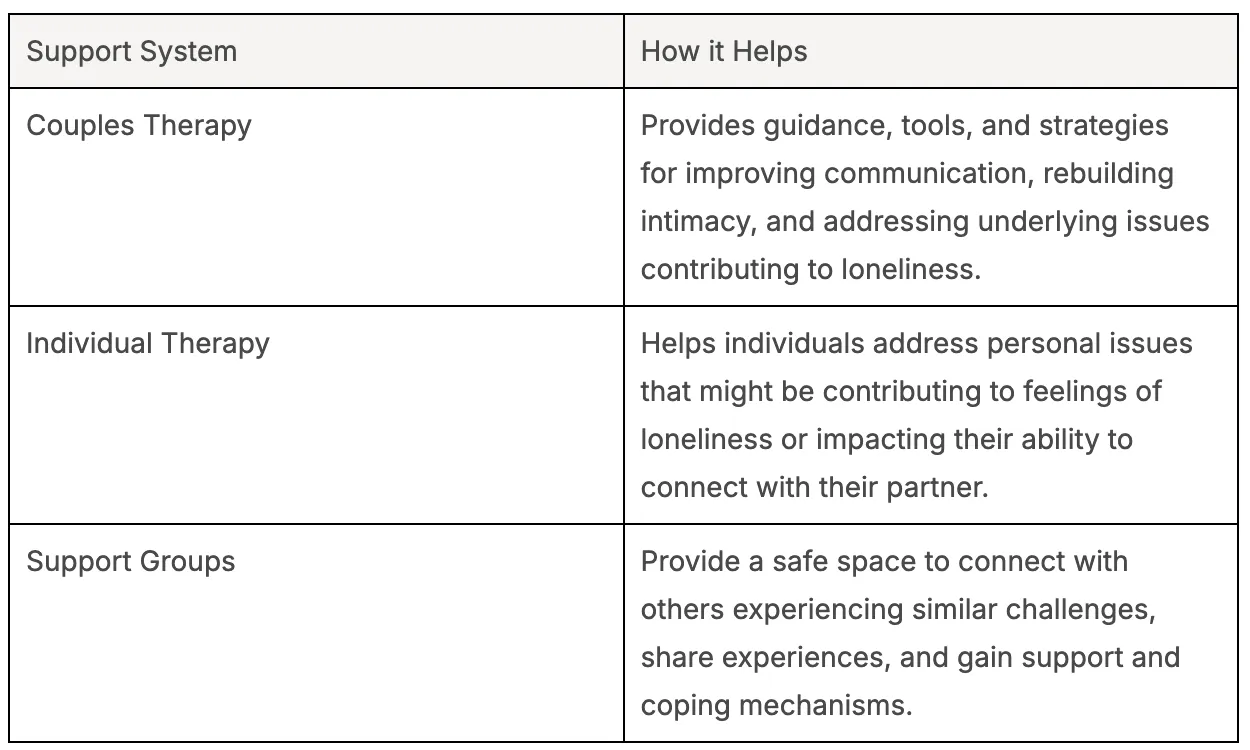Marriage should be a place of love and companionship. However, it can sometimes make people feel lonely. While marriage promises love, shared moments, and deep fulfillment, a lack of emotional connection can still cause loneliness, even when couples are together. This guide looks at the details of marital loneliness. It will help you notice its signs, understand its effects, and use strategies to create a more fulfilling and connected relationship.

Feeling lonely in a marriage doesn’t mean you are physically alone. It’s about the lack of emotional closeness with the person who should be your best friend. It is that sense of being isolated when your emotional needs are not met. This makes you feel misunderstood, invisible, and ignored.
This feeling can be very lonely, especially because you are in a relationship that is meant for love and support. Understanding that you are not the only one who feels like this is the first step. It helps you to tackle the problem and create a deeper and happier connection with your partner.
It is important to know the difference between solitude and loneliness, especially in marriage. Solitude can be a good experience. It means choosing to be alone without feeling bad. This time can help you think, reflect, and recharge. Loneliness, on the other hand, is a bad feeling of isolation and emptiness. You can feel lonely even if you are surrounded by people, including your spouse.
In a marriage, solitude can be healthy. Taking time for yourself helps you be your best in the relationship. But if solitude turns into loneliness, it shows that there is a lack of emotional intimacy and connection. This can lead to feelings of isolation and dissatisfaction.
Knowing the difference is key. It helps you see when your need for alone time changes into a wish for deeper intimacy with your partner. Recognizing this shift lets you tackle the problems and work to rebuild emotional closeness.
Life and relationships can be tough, sometimes making us feel lonely even in marriage. Big events in life, even happy ones, can cause this loneliness. For example, having a baby is a joyful moment, but it can also make partners feel distant as they adjust to their new roles and responsibilities.
On top of this, outside pressures like job stress, money problems, taking care of older parents, or the society’s view of a single mother can change how a couple connects. These pressures can lead to less time together and less emotional intimacy.
When outside stress becomes the main focus, couples might forget about their emotional bond. This can leave one or both partners feeling unimportant and lonely. It's important to talk about these stressors openly. By working together to handle them, couples can keep them from becoming big issues in their relationship.
Ignoring the small signs of loneliness in your marriage can allow it to grow. This might cause bigger problems later on. If you notice these signs early, you can fix them before they harm your emotional connection.
Pay attention to how you talk to each other. Think about how often you communicate and how close you feel to your partner. These little details show a lot about the health of your emotional connection. If you overlook them, you could end up feeling more disconnected and alone.
One big sign of loneliness in a marriage is emotional distance. This distance shows up as a lack of sharing feelings and closeness. It can make you feel like you're living with a roommate instead of a partner. You might spend less quality time together, have shallow talks, or avoid important conversations.
This emotional gap can make you feel very alone, even when you are with your partner. It's like speaking different languages; you can hear the words, but you don't feel the connection. This can leave you feeling misunderstood and lonely.
It's important to notice this emotional distance. It can be a sign of bigger problems in the marriage. If you ignore it, the gap may grow wider, leading to anger and more isolation. Facing this issue directly can help you rebuild closeness and make your emotional bond stronger.
Communication is very important for a healthy relationship. When there is a lack of it in a marriage, it can lead to loneliness. Silence might show less talking, but it also means not having deep conversations. You may discuss daily tasks, but you might not share your true emotions—like your dreams, fears, and hopes.
When communication breaks down, misunderstandings and resentment can grow. You may feel ignored and think that your feelings don’t matter.
The best way to fix this issue is to remember that communication goes both ways. It's important to share your own feelings and needs. But it’s just as important to make a safe space for your partner to share theirs too.
Marital loneliness is not just a small problem; it is a serious issue that can greatly affect both people and the marriage. If you ignore it, it can seep into different parts of your life. This can harm your feelings and your relationship.
Not dealing with marital loneliness can create a cycle that impacts how you feel and how you interact with your partner. As a result, this can lead to changes in behavior and problems in communication, making you feel more distant from each other.
Loneliness in a marriage can have serious effects on your mind and emotions. When you feel cut off from your spouse, who is meant to be your best friend, it can lead to many negative feelings. You may notice increased stress, anxiety, and even feelings of depression.
This emotional struggle can spill over into other parts of your life. You might find it hard to focus at work. Your sleep can also change, and you may start avoiding friends and family. This social withdrawal can make your feelings of loneliness even worse, trapping you in a cycle of sadness and isolation.
It’s important to know that experiencing these feelings of loneliness isn't a sign of weakness. It’s a normal reaction when you’re not feeling connected in a relationship that should feel safe and comforting. Recognizing your feelings and getting help from your partner or a therapist can be vital for managing this difficult time and avoiding long-term emotional harm.
Marital loneliness affects more than just individual happiness. It creates problems in the relationship, often leading to more negativity and lack of connection. As emotional distance increases, so do feelings like resentment and misunderstanding. You may find yourselves fighting more often, closing off emotionally, or pointing fingers at each other.
When loneliness settles in a marriage, both physical and emotional intimacy suffer. A lack of emotional connection often means less physical affection, which deepens the gap between partners. This loss of intimacy can make feelings of loneliness and rejection even stronger, creating a hard cycle to break.
It's good to remember that even happy couples go through times of distance and disconnect. What sets them apart is their ability to spot these signs early. They communicate openly and work together to strengthen their emotional connection.

Overcoming loneliness in a marriage takes effort from both partners. You need to rebuild trust, improve communication, and bring back the emotional closeness that first connected you. This process is a journey, not a final goal, and it needs patience, empathy, and strong commitment.
Think of these strategies as chances to invest in your marriage and yourselves. When you work together, you can change loneliness from something that breaks relationships into a tool for growth and a better understanding of each other.
Open and honest talk is key to solving any problem in a marriage, including feelings of loneliness. To start these important discussions, you need care, understanding, and a focus on each other, not blame.
First, find a safe and comfy place to talk where you both can share without interruptions. Use "I" statements to share your feelings. Focus on how loneliness affects you rather than pointing fingers at your partner. For example, instead of saying, "You never make me feel special," try saying, "I've been feeling lonely lately and would love to spend some time together."
Here are some tips for open conversations:
Rekindling intimacy is important to fight loneliness in marriage. Intimacy is more than just the physical part. It includes emotional, intellectual, and experiential connections, too. Start by making time for each other. Just 15-20 minutes each day, without distractions, can help.
Do things you both enjoy together. This could be cooking dinner, taking walks, or talking about happy memories. Physical touch is also a great way to rebuild intimacy. Simple acts like holding hands, cuddling on the couch, or giving back rubs can help bridge the emotional gap.
Don't overlook the need for a regular date night. Set aside special time just for the two of you. When you are free from daily stresses, it helps you reconnect deeply. This time together brings excitement and anticipation to your relationship.
While open communication and intimacy are paramount, recognizing when seeking external support is crucial. Sometimes, navigating the complexities of marital loneliness requires a neutral third party, like a therapist, who can provide guidance, tools, and strategies tailored to your specific needs.
Couples therapy offers a safe and confidential environment to discuss your feelings, uncover underlying issues contributing to loneliness, and develop a plan for re-establishing connection. A skilled therapist can help you identify negative communication patterns, understand each other's needs, and develop healthier ways of interacting.
Here's a breakdown of potential support systems:

Loneliness in marriage is a tricky emotion. It needs to be recognized and dealt with actively. Understanding the difference between solitude and loneliness can help you manage your feelings better. It’s important to notice signs like emotional distance and less communication. Loneliness can affect both your mind and your relationship. To fight marital loneliness, you should start open talks, bring back intimacy, and consider getting help from others. Good communication is crucial, as it allows you to share feelings without causing fights. Many people feel lonely in marriage, but facing it openly is important for a healthier and stronger relationship.
Pick a quiet time to share your feelings of loneliness. Use "I" statements to talk about your emotions without pointing fingers at your partner. Show empathy and try to understand how they feel. This way, you can create a safe space that encourages open communication.
Yes, you can feel lonely in a marriage even when you are together. Real fulfillment comes from a strong emotional connection. If this connection is missing, you may feel like you are not being heard or seen. You might feel emotionally empty even if you are close in person.
Stay informed about the latest research in psychology.
.png)
Explore Medicare options in Houston and choose coverage that supports your health and well-being.
.png)
Your guide to Medicare Advantage plans in Houston, covering benefits, costs, and mental health care.
.png)
A practical guide to nursing isolation precautions, PPE, and mental health support in Houston.